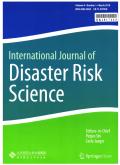Urban Earthquake Vulnerability Assessment and Mapping at the Microscale Based on the Catastrophe Progression Method
IF 4
2区 地球科学
Q2 GEOSCIENCES, MULTIDISCIPLINARY
引用次数: 0
Abstract
Abstract Vulnerability assessment and mapping play a crucial role in disaster risk reduction and planning for adaptation to a future earthquake. Turkey is one of the most at-risk countries for earthquake disasters worldwide. Therefore, it is imperative to develop effective earthquake vulnerability assessment and mapping at practically relevant scales. In this study, a holistic earthquake vulnerability index that addresses the multidimensional nature of earthquake vulnerability was constructed. With the aim of representing the vulnerability as a continuum across space, buildings were set as the smallest unit of analysis. The study area is in İzmit City of Turkey, with the exposed human and structural elements falling inside the most hazardous zone of seismicity. The index was represented by the building vulnerability, socioeconomic vulnerability, and vulnerability of the built environment. To minimize the subjectivity and uncertainty that the vulnerability indices based on expert knowledge are suffering from, an extension of the catastrophe progression method for the objective weighing of indicators was proposed. Earthquake vulnerability index and components were mapped, a local spatial autocorrelation metric was employed where the hotspot maps demarcated the earthquake vulnerability, and the study quantitatively revealed an estimate of people at risk. With its objectivity and straightforward implementation, the method can aid decision support for disaster risk reduction and emergency management.基于突变级数法的微尺度城市地震易损性评价与制图
脆弱性评估与制图在减少灾害风险和规划未来地震适应中发挥着至关重要的作用。土耳其是世界上最容易发生地震灾害的国家之一。因此,在实际相关尺度上开展有效的地震易损性评价与制图势在必行。本文构建了反映地震易损性多维性的整体地震易损性指数。为了将脆弱性表现为跨空间的连续体,建筑被设置为最小的分析单元。研究区域位于İzmit土耳其市,暴露的人员和结构元素位于地震活动最危险的区域内。该指数由建筑脆弱性、社会经济脆弱性和建筑环境脆弱性表示。为了最大限度地降低基于专家知识的脆弱性指标的主观性和不确定性,提出了一种基于突变级数法的指标客观加权扩展方法。绘制地震易损性指数和分量图,利用热点图对地震易损性进行局部空间自相关度量,定量揭示地震易损性人群的估计值。该方法客观、实施简单,有助于为减少灾害风险和应急管理提供决策支持。
本文章由计算机程序翻译,如有差异,请以英文原文为准。
求助全文
约1分钟内获得全文
求助全文
来源期刊

International Journal of Disaster Risk Science
GEOSCIENCES, MULTIDISCIPLINARYMETEOROLOGY-METEOROLOGY & ATMOSPHERIC SCIENCES
CiteScore
6.50
自引率
7.50%
发文量
63
审稿时长
13 weeks
期刊介绍:
The International Journal of Disaster Risk Science (IJDRS) provides a pioneering platform for researchers and practitioners aiming at greater resilience and integrated risk governance in view of local, regional, and global disasters. IJDRS breaks new ground in research about disaster risks by connecting in-depth studies of actual disasters and of specific practices of disaster risk management with investigations of the global dynamics of disaster risks and theories and models relevant for advanced integrated risk governance.
 求助内容:
求助内容: 应助结果提醒方式:
应助结果提醒方式:


